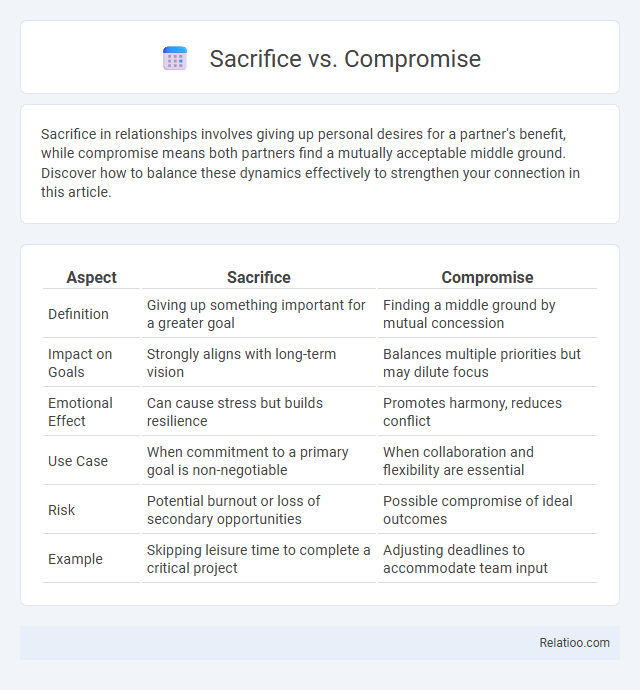Sacrifice in relationships involves giving up personal desires for a partner's benefit, while compromise means both partners find a mutually acceptable middle ground. Discover how to balance these dynamics effectively to strengthen your connection in this article.
Table of Comparison
| Aspect | Sacrifice | Compromise |
|---|---|---|
| Definition | Giving up something important for a greater goal | Finding a middle ground by mutual concession |
| Impact on Goals | Strongly aligns with long-term vision | Balances multiple priorities but may dilute focus |
| Emotional Effect | Can cause stress but builds resilience | Promotes harmony, reduces conflict |
| Use Case | When commitment to a primary goal is non-negotiable | When collaboration and flexibility are essential |
| Risk | Potential burnout or loss of secondary opportunities | Possible compromise of ideal outcomes |
| Example | Skipping leisure time to complete a critical project | Adjusting deadlines to accommodate team input |
Understanding Sacrifice and Compromise
Understanding sacrifice involves recognizing the deliberate offering of something valuable for the sake of a greater purpose or another's benefit. Compromise requires both parties to make concessions, balancing interests to reach a mutually acceptable solution without fully relinquishing core needs. Your ability to distinguish between sacrificing for important goals and compromising for practical resolutions can significantly impact personal and professional relationships.
Key Differences Between Sacrifice and Compromise
Sacrifice involves giving up something valuable for a greater cause or benefit, often requiring personal loss or hardship, while compromise entails mutual concessions where both parties adjust their demands to reach an agreement. Sacrifices typically reflect unilateral decisions aimed at long-term goals or principles, whereas compromises emphasize balance and cooperation in resolving conflicts or differences. Understanding these distinctions is crucial for effective decision-making in relationships, negotiations, and personal growth.
The Psychology Behind Sacrifice
Sacrifice involves giving up something valuable for the benefit of others or a greater cause, often linked to intrinsic motivation and deep personal values. Compromise, in contrast, entails mutual concession aimed at conflict resolution without significant loss to either party, reflecting cognitive flexibility and social negotiation skills. The psychology behind sacrifice reveals complex emotional processes, including empathy, self-discipline, and identity reinforcement, highlighting its role in strengthening social bonds and fostering long-term commitment.
The Role of Compromise in Relationships
Compromise in relationships serves as a vital mechanism for balancing individual needs and fostering mutual respect, preventing resentment that often arises from one-sided sacrifice. Unlike sacrifice, which may involve significant personal loss or hardship, compromise requires both partners to make concessions, maintaining a healthier dynamic and promoting long-term stability. Effective compromise enhances emotional intimacy by encouraging open communication and shared decision-making, crucial components for sustainable partnerships.
Benefits and Drawbacks of Sacrifice
Sacrifice involves giving up something valuable for a greater good, which can lead to personal growth and strengthened relationships but may also result in resentment or loss of self-identity. Unlike compromise, where both parties make mutual concessions, sacrifice often benefits others more than yourself, possibly causing emotional or physical burnout. Understanding the benefits and drawbacks of sacrifice helps you balance altruism with self-care to maintain healthy boundaries.
Benefits and Drawbacks of Compromise
Compromise offers the benefit of mutual agreement by balancing conflicting interests, which helps maintain relationships and fosters collaboration in personal and professional settings. However, compromising can lead to drawbacks such as partial dissatisfaction, as neither party may achieve their full desired outcome, potentially breeding resentment or a feeling of loss. Your ability to discern when compromise is appropriate versus when full sacrifice is necessary can impact long-term trust and success in negotiations.
When Is Sacrifice Necessary?
Sacrifice becomes necessary when achieving a critical goal aligns with your core values and long-term success, requiring you to let go of immediate comforts or desires. Unlike compromise, which seeks a balanced middle ground acceptable to all parties, sacrifice demands a decisive relinquishment of something valuable for a higher purpose or greater good. Understanding when your sacrifices are essential helps maintain focus and resilience in the face of daunting challenges.
Finding Balance: Healthy Compromises
Finding balance between sacrifice and compromise is essential for maintaining healthy relationships and personal well-being. Your ability to recognize when to make sacrifices versus when to seek compromises ensures that both your needs and those of others are respected. Prioritizing healthy compromises fosters mutual understanding and sustainable connections without sacrificing your core values.
Red Flags: Unhealthy Sacrifice or Compromise
Unhealthy sacrifice or compromise often signals red flags like loss of self-identity, resentment, and imbalance in relationships. You may feel controlled or undervalued when your needs are consistently ignored in favor of others'. Recognizing these signs early helps protect your emotional well-being and maintain mutual respect.
Cultivating Mutual Respect in Sacrifice and Compromise
Sacrifice and compromise both require putting aside personal desires for the benefit of a relationship, but sacrifice often entails a deeper, more selfless act, while compromise seeks a balanced middle ground. Your ability to cultivate mutual respect through these acts fosters trust and strengthens emotional bonds by showing willingness to prioritize the other person's needs. Recognizing the difference between sacrifices that enhance harmony and compromises that create equitable solutions is essential for sustaining healthy, respectful connections.

Infographic: Sacrifice vs Compromise
 relatioo.com
relatioo.com